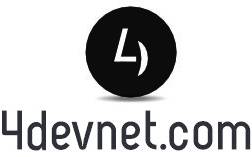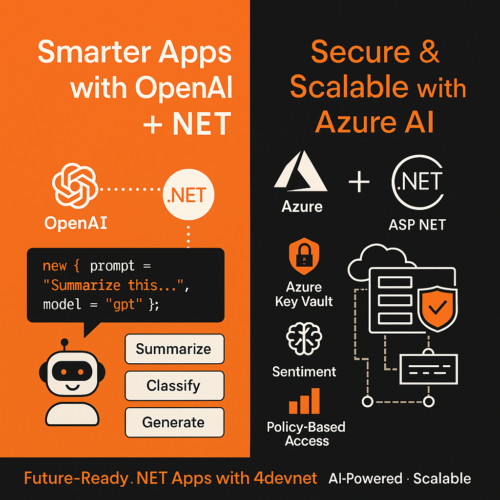Smart .NET Development with AI Tools
Introduction
Artificial Intelligence is no longer an emerging trend—it is a core pillar of modern enterprise software. With increasing demand for intelligent automation, real-time insights, and conversational interfaces, .NET developers can now leverage powerful AI services from OpenAI and Azure AI to build smarter, faster, and more context-aware applications.
As a trusted .NET development company in Ahmedabad, Gujarat, 4devnet specializes in integrating AI capabilities into enterprise-grade ASP.NET Core solutions. This article explores how to effectively integrate OpenAI and Azure AI into .NET applications to deliver future-ready digital experiences.
Why Add AI to Your ASP.NET Core Applications? Integrating AI enables .NET developers to:
- Enhance User Interactions through chatbots, smart assistants, and contextual interfaces.
- Automate Business Processes like summarizing content, triaging tickets, or extracting insights from documents.
- Make Data-Driven Decisions by analyzing patterns, sentiments, and behaviors in real time.
- Scale Personalization across digital channels using natural language understanding and machine learning.
OpenAI vs Azure AI: Which One Should You Use?
| Criteria | OpenAI | Azure AI (via Azure Cognitive Services) |
| Natural Language Models | GPT-4, GPT-3.5 | GPT models via Azure OpenAI API |
| AI Services Suite | Text-focused | Text, Vision, Speech, Translation |
| Deployment | Public Cloud | Fully Azure-integrated |
| Security & Governance | Standard APIs | Enterprise-grade compliance (Azure AD, RBAC) |
| Best For | Generative AI, Chatbots, Text Generation | Multimodal AI, Enterprise Compliance, Scalability |
Use OpenAI for tasks like advanced content generation or conversational UX. Opt for Azure AI when you require multi-service integration with strong governance, identity control, and data residency.
Integrating OpenAI with ASP.NET Core: Step-by-Step
Step 1: Configure HTTP Client
services.AddHttpClient(“OpenAI”, client =>
{
client.BaseAddress = new Uri(“https://api.openai.com/v1/”);
});
Step 2: Send Prompt to OpenAI
var request = new HttpRequestMessage(HttpMethod.Post, “chat/completions”);
request.Headers.Add(“Authorization”, $”Bearer {apiKey}”);
request.Content = new StringContent(JsonConvert.SerializeObject(new {
model = “gpt-4”,
messages = new[] {
new { role = “user”, content = “Summarize this document…” }
},
max_tokens = 250
}), Encoding.UTF8, “application/json”);
Step 3: Process and Display AI Response
var result = await response.Content.ReadAsStringAsync();
dynamic data = JsonConvert.DeserializeObject(result);
string summary = data.choices[0].message.content;
return View(“Summary”, summary);
Using Azure AI with ASP.NET Core.
Use Case 1: Text Analytics:
var client = new TextAnalyticsClient(new Uri(endpoint), new AzureKeyCredential(key));
var response = await client.AnalyzeSentimentAsync(“Customer feedback is very positive!”);
Console.WriteLine(response.Value.Sentiment);
Use Case 2: Azure OpenAI for Chatbots:
- Set up Azure OpenAI resource in Azure Portal.
- Authenticate using Azure.Identity.
- Integrate with ASP.NET Core services as REST API or middleware.
Use Case 3: Azure Key Vault + AI Integration Secure your API keys and secrets using Azure Key Vault:
builder.Configuration.AddAzureKeyVault(new Uri(keyVaultUrl), new DefaultAzureCredential());
Security Best Practices:
- Use Azure Key Vault or User Secrets for storing API keys.
- Enable HTTPS and rate limiting for AI endpoints.
- Log AI inputs and outputs for observability.
- Monitor token usage and performance.
- Follow enterprise governance (GDPR, HIPAA, SOC 2).
Ideal AI Use Cases in ASP.NET Core:
- AI-Driven Chatbots for service desks or HR portals.
- Automated Document Summarization for legal or policy content.
- Knowledge Mining using Cognitive Search + OpenAI.
- Intelligent Email Classification for CRM and ERP platforms.
- Smart Search that understands user intent.
Best Practices for AI Integration:
- Start with low-risk features like document tagging or FAQs.
- Use logs and metrics to track AI performance and failures.
- Offer fallback options when AI responses are ambiguous.
- Stay updated with API versioning and rate limits.
- Conduct regular security and bias audits.
Conclusion Whether you’re building intelligent web portals, conversational agents, or analytics. dashboards, integrating OpenAI or Azure AI into your ASP.NET Core application opens new possibilities for innovation and efficiency.
Both platforms provide robust capabilities—but your choice depends on your compliance needs, deployment strategy, and use cases.
Work with Experts in AI-Powered .NET Development 4devnet, a leading .NET development company in Ahmedabad, empowers enterprises to build secure, intelligent, and scalable applications by integrating the latest in AI technology with the performance of ASP.NET Core.
Let’s discuss how we can modernize your applications with AI.


